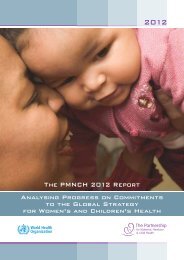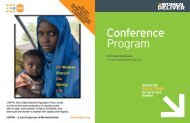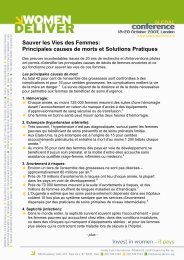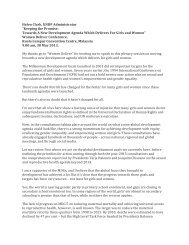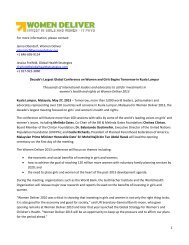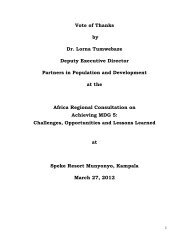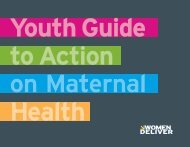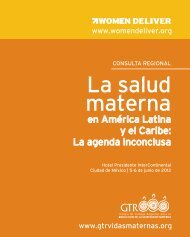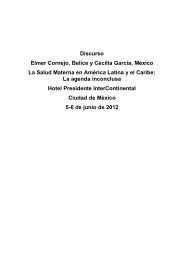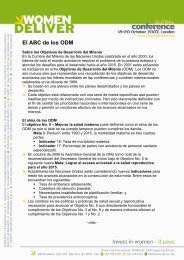State of World Population 2012 - UNFPA Haiti
State of World Population 2012 - UNFPA Haiti
State of World Population 2012 - UNFPA Haiti
You also want an ePaper? Increase the reach of your titles
YUMPU automatically turns print PDFs into web optimized ePapers that Google loves.
CHAPTERONEThe right t<strong>of</strong>amily planningA fundamental human rightPlanning the number and timing <strong>of</strong> one’s children is today largely taken forgranted by the millions <strong>of</strong> people who have the means and power to do so. Yeta large proportion <strong>of</strong> the world’s people do not enjoy the right to choose whenand how many children to have because they have no access to family planninginformation and services, or because the quality <strong>of</strong> services available to them is sopoor that they go without and are vulnerable to unintended pregnancy.tMothers ata women'sadvocacy centreattend a talk oncontraception inPakistan.©Panos/Peter BarkerThe international community agreed in 1994at the International Conference for <strong>Population</strong>and Development, ICPD, that family planningshould be made available to everyone who wantsit, and that governments should create the conditionsthat support people’s right to plan theirfamilies. But recent research shows that 222million women in developing countries todaydo not have the means to delay pregnancies andchildbearing. Millions <strong>of</strong> women in developedcountries are also unable to plan their familiesbecause they lack access to information, education,and counselling on family planning, cannotaccess contraceptives and face social, economicor cultural barriers, including discrimination,coercion and violence in the context <strong>of</strong> theirsexual and reproductive lives.The number and spacing <strong>of</strong> children can havean impact on the schooling prospects, incomeand well-being <strong>of</strong> women and girls, and also<strong>of</strong> men and boys. The right to family planningtherefore permits the enjoyment <strong>of</strong> other rights,including the rights to health, education, and theachievement <strong>of</strong> a life with dignity. An informedrights-based approach to family planning is themost cost-effective intervention for addressingmaternal mortality and morbidity. Ensuring theright to family planning can ultimately acceleratea country’s progress towards reducing poverty andachieving development goals. Universal accessto reproductive health services, including familyplanning, is sufficiently important that it is part<strong>of</strong> the United Nations Millennium DevelopmentGoals. And it will be fundamental to achievingmany <strong>of</strong> the priority goals emerging from thepost-2015 sustainable development framework.Although family planning is a fundamentalright, it is met at times with ambivalence fromcommunities, health systems and governments.The commitment to family planning can beundermined by its association with sexual activityand its meaning in the context <strong>of</strong> social andcultural values. In practical terms, concernswith extending access to specific populationTHE STATE OF WORLD POPULATION <strong>2012</strong>1




